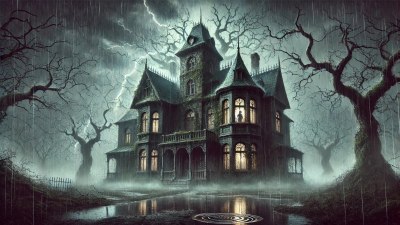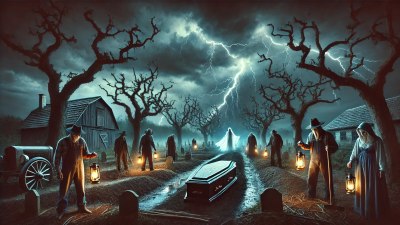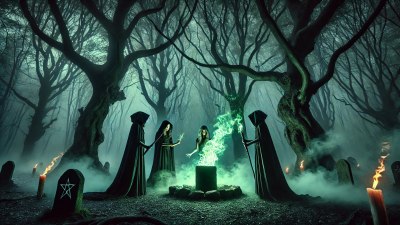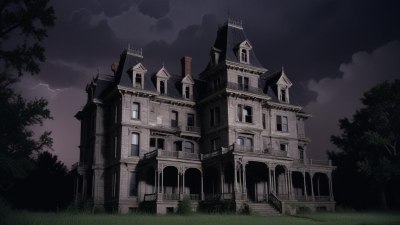The Mystery of Black Jean (Mystery Story)
A gripping tale of murder, mystery, and dark intrigue in the Canadian wilderness. Тhe story follows Black Jean—a towering French-Canadian drifter with a penchant for bears—and his mysterious relationship with two equally enigmatic women...
 Julian Kilman
Julian Kilman 
This image was created with the assistance of DALL·E
Aye, sir, since you have asked, there has been many a guess about where Black Jean finally disappeared to.
He was a French-Canadian and a weed of a man— six-feet-five in his socks; his eyes were little and close together and black; he wore a long thin mustache that drooped; and he was as hairy as his two bears.
He just drifted up here to the North, I guess, picking up what scanty living he could by wrestling with the bears and making them wrestle each other. ’Twas in the King William hotel that many’s the time I’ve seen Black Jean drink whisky by the cupful and feed it to the bears. Yes, he was interesting, especially to us boys.
Along about the time the French-Canadian and his trick animals were getting to be an old story, there comes— begging your pardon— a Yankee, who said he would put up a windmill at Morgan’s Cove if he could get the quicklime to make the mortar with.
Black Jean said he knew how to make lime and if they would give him time he would put up a kiln. So the French-Canadian went to work and built that limekiln you see standing there.
I was a youngster then, and I know how Black Jean, a little later, built his cabin. I used to hide and watch him and his bears. They worked like men together, with an ugly-looking woman that had joined them. They put up the cabin, the bears doing most of the heavy lifting work.
The place he picked for the cabin— over there where that clump of trees.... No, not that way— more to the right, half a mile about— that place is called “Split Hill,” because there is a deep crack in the rock made by some earthquake. The French-Canadian built his cabin across the crack, and as the woman quarreled with him about the bears sleeping in the cabin he made a trap-door in the floor of the building and stuck a small log down it, so the bears could climb up and down from their den below.
The kiln, you can see for yourself, is a pit-kiln, so called because it is in the side of a hill and the limestone is fed from the top and the fuel from the bottom. Like a big chimney it works, and when Black Jean got the fire started and going good it would roar up through the stone and cook it. You could see the blaze for a mile.
One day Black Jean came to the King William looking for that Yankee. Seems that individual hadn’t paid for his lime. When Black Jean didn’t find him at the tavern he started for the Cove.
I have never known who struck first; but they say the Yankee called Black Jean a damn frog-eater and there was a fight; and that afternoon the French-Canadian came to the tavern with his bears and all three of them got drunk. Black Jean used to keep a muzzle on the larger of the bears, but by tilting the brute’s head he could pour whisky down its throat. They got pretty drunk, and then someone dared Black Jean to wrestle the muzzled bear.
There was a big tree standing in front of the tavern, and close by was a worn-out pump having a big iron handle. Black Jean and the bear went at it under the tree, the two of them clinching and hugging and swearing until they both gasped for air. This day the big bear was rougher than usual, and Black Jean lost his temper. It was his custom when he got in too tight a place to kick the bear in the stomach; and this time he began using his feet.
Suddenly we heard a rip of clothing. The bear had unsheathed his claws; they were sharp as razors and tore Black Jean’s clothing into shreds and brought blood. Black Jean broke loose, his eyes flashing, his teeth gritting. Like lightning, he grabbed his dirk and leaped at the brute and jabbed the knife into its eye and gave a quick twist. The eyeball popped out and hung down by shreds alongside the bear’s jaw.
Never can I forget the human-sounding shriek that bear gave, and how my father caught me up and scrambled behind the tree as the bear started for Black Jean. But the animal was near blinded, and Black Jean had time to jerk the iron handle out of the pump; and then, using it as if it didn’t weigh any more than a spider’s thought, he beat the bear over the head. He knocked it cold.
Then my father said: “That bear will kill you some day, Jean.”
Black Jean stuck the iron pump handle back into its place.
“ Bagosh! you t’ink dat true?” he sneered. “Mebbe I keel her , eh?”
Our place was next to the piece where Black Jean lived, and it was only next morning we heard a loud yelling over at Split Hill. I was a little fellow but spry, and when I reached Black Jean’s cabin I was ahead of my father. I saw the French-Canadian leaning against a stump all alone, the blood streaming from his face.
“By God, M’sieu!” he blurted, when my father came up. “She scrat’ my eye out.”
My father thought he meant the woman.
“Who did?” he asked.
“Dat dam’ bear,” said Black Jean. “She just walk up an’ steeck her foots in my eye.”
Father caught hold of Black Jean and helped him to the cabin.
“Which bear was it?” he asked.
Black Jean slumped forward without answering. He had fainted.
I helped father get him into the house— he was more than one man could carry— and just as we went inside there was a growling and snarling, and the big muzzled bear went sliding down that pole to her nest.
Well, we looked all around for the woman, expecting to get her help; but we couldn’t find her, which was the first we knew that she had left Black Jean.
It took the French-Canadian’s eye two or three months to heal, and then he came to our place to get something to wear over the empty socket. So father hammered out a circular piece of copper about twice the size of a silver dollar and bored a hole in opposite sides for a leather thong to hold it in place. Black Jean always wore it after that. He seemed vain of that piece of copper, for he used to keep it polished and shined until it glowed on a bright day like a bit of fire.
That fall the settlers opened up the first school in the district and imported a woman teacher from “The States.”
I must tell you about that teacher. She was a thin, little mite of a thing that you would think the wind would blow away. Some said she was pretty and some that she wasn’t. I could have called her pretty if her eyes hadn’t been so black— hereabouts you don’t see many eyes that are black— brown, maybe, and blue and gray, but not black. Fact is, there were just two people in these parts having those black eyes: Black Jean and the little mite of a school teacher.
Well she came. And she hadn’t been here a month before it was noticed that Black Jean was coming to town more regular. And, what is more, he was coming down by the school and waiting around there with his bears.
This went on. They say that at first she didn’t pay any attention to him, but I can’t speak for that as I was too young. But in time there was talk and it came to me: then I watched. And I remember one afternoon after the teacher let us out we all went over to where the bears were. The teacher followed.
Black Jean was grinning and showing his white teeth.
“Beautiful ladee,” says he. “Sooch eyes, mooch black like the back of a water-bug.”
Teacher smiled and said something I couldn’t understand. It must have been French. I had never seen a Frenchman around women before, and Black Jean’s manners were new to me. Here was a big weed of a man bowing and scraping and standing with his cap in his hand. We boys laughed at that— holding his cap in his hand.
The long and short of it was the French-Canadian was sparking the school teacher. And everybody talked about it, of course; they said it was a shame; they said if she didn’t have sense enough to see what kind of a man he was, someone should tell her.
I have often wondered since what would have happened if anybody had gone to that woman with stories of Black Jean. I know I’d never dared to, because, without knowing why, I was afraid of her. I guess maybe that is why the others didn’t, either.
There was no mistaking she was encouraging to Black Jean. She didn’t seem to object in the slightest to his attentions, and I can see them yet: her, little and pretty and in a white dress, and Black Jean lingering there with his bears, dirty, and towering head and shoulders above her.
Black Jean kept coming and people went on talking, and finally somebody said she had been to Split Hill.
And one day I began to understand it, too. It was the time she was punishing some pupils. Three of them were lined up before her, and she started along whacking the outstretched hands with a stout ruler. Right in front of where I was sitting stood Ben Anger. He was the smallest of the lot and was trembling like a leaf.
Her first clip at him must have raised a welt on his hands, because he whimpered. She hit him again, and he closed his fingers. At that she caught up the jackknife he’d been whittling at his desk with and pried at his fingers until the blood came.
Sitting where I was, I saw her face while she was at it. It had the expression of a female devil. I didn’t say anything to my folks about that; but I wasn’t surprised when word came next week that we were to have a new teacher— the little one had gone to live with Black Jean.
Well, there was more talk— talk of rail-riding the pair of them out of the district. But nothing was done, and one evening, a month later, there was a rap at our door and the French-Canadian staggered in. He was carrying the school teacher in his arms.
“What has happened?” my father demanded.
“Dat dam’ leetle bear,” snarled Black Jean— “She try to keel Madam.”
He laid the woman on the bed. She looked pretty badly cut up, and we sent for the doctor. Mother would only let her stay in the house that night, being shocked at the way she was living with the French-Canadian.
It turned out she wasn’t much hurt, and father kept trying to find out just what had happened. But he couldn’t. I knew, however. Most of my time, when I wasn’t in school or running errands for the folks, I was spending watching that couple, and only that afternoon I had seen her stick a hot poker into the side of the smaller bear and wind it up into his fur until he screamed. And the bear must have bided his time and gone for her— those brutes were just like folks.
Next morning Black Jean came and got his woman, and I stole out and followed. I knew there would be more to it. I was right. The two of them went into the cabin, and pretty soon I heard a rumpus and out comes Black Jean with the smaller bear and behind them the woman. She was carrying a cowhide whip.
The French-Canadian had a chain looped about each forepaw of the animal, and, pulling it under a tree, he tossed the free end of the chain over a stout branch and yanked the bear off his feet. Then he wound the end of the chain about the trunk of the tree and sat down. So the bear hung, his feet trussed, and squirming and helpless.
And there in that clear day and warm sunshine, the woman started at the bear with the whip. She lashed it until it cried like a child. Black Jean watched the proceedings and grinned.
“Bah!” he shouted, after the woman had begun to tire. “She t’ink you foolin’. Heet harder. Heet the eyes!”
Again the woman went at it and kept it up until the bear quit moaning, and its head drooped and its body got limp. I was feeling sick at the sight, and I stole away.
But next morning, when I crawled back, there was the bear still hanging. It was dead.
That woman was a fair mate for Black Jean.
She kept him working steady over here to this kiln— most any night you could see the reflection of the blaze— and it was something to watch Black Jean when he was feeding his fire with the light playing on that copper piece and making it look like a big red eye flashing in the night. I saw it many times.
And it was noticed that Black Jean wasn’t getting drunk any more, and he wasn’t wrestling the one-eyed bear any more. He had good reason for that. I began to believe Black Jean was afraid of that brute.
But he made it work for him in the kiln, using the whip, and it was a curious animal, growling and snarling most of the time, as it pulled and lifted big sticks of wood and lugged them to the kiln.
When Black Jean wasn’t working he was over at the cabin where he would follow the woman around like a dog. She could make him do anything. She was getting thinner and crosser, and I was more afraid of her than ever I was of Black Jean.
Once she caught me watching her from my spying-place in a tree. She had been petting the one-eyed bear, rubbing his snout and feeding him sugar. She ran to the house and got a rifle and, my friends, I came down out of that tree lickety split.
When I reached the ground she didn’t say a word— just let her eyes rest on mine. After that I was more careful.
Then something happened.
I was hoeing corn one afternoon in a field next the road when I spied a woman coming along from the village. She was big and blowsy and was wearing a shawl. I knew she was headed for Black Jean’s, because she climbed through the fence on his side of the road.
Keeping her in sight, I followed along my side and crossed over when I came to a place where she couldn’t see me. I followed her because I knew she was the woman who had come to Black Jean when he first landed in the district. She walked up to the cabin, and I was wondering who she would find home, when out comes Black Jean.
“ Sacre! ” he exclaimed, putting one hand to his eye. “Spik queeck! Ees it Marie?”
“Yes,” the woman said. “I have come back.”
Black Jean looked around fearfully.
“Wat you want?” he demanded.
“I’d like to know who knocked your eye out,” she laughed.
Black Jean did not laugh.
“You steal hunder’ dollar from me an’ run ’way,” he snarled. “ Bagosh! You give me dat monee.”
“You fool!” said the woman. “You think I don’t know where you got that money? You killed— ”
A sound of rustling leaves in the wood nearby interrupted.
“ Ssh! ” hissed Black Jean, his face blanching. “For de love o’ God, nod so loud.”
He listened a moment; then his expression grew crafty. His teeth showed, and he went close to the woman and said something and started into the cabin.
The next instant I knew someone else had seen them. It was no other than the little ex-school teacher— and she was running away! I lay still a moment, scared out of my wits. Then I went home.
“Did you see Black Jean’s wife?” my mother asked.
“You mean the school teacher woman?” I said.
“Yes,” my mother said. “Who else?”
“I did,” I said, “a while ago.”
“I mean just now,” said my mother, breathing quick. “She rushed in here, right into the house, and before I could stop her she snatched your father’s rifle from the wall and ran out.”
I didn’t wait to hear more.
I set off through the fields for Black Jean’s. Before I had run half the distance, I heard shooting, and it was father’s rifle— I knew the sound of her only too well.
When I got to my spying-place it was all quiet at Black Jean’s. I could not see a thing stirring about the cabin.
Then I thought of mother and started home. Father had gone over to the Cove that morning, with a load of wheat for the Yankee’s mill, and wasn’t to get back until late. So mother and I waited.
It was nearly one o’clock in the morning when we heard father’s wagon, and I rushed outside.
“Hello, son,” he exclaimed. “You’re up late. And here’s mother, too.”
Father listened to what we told him, without saying a word.
“Well,” he said, when we had finished. “I don’t really see anything to worry about. Black Jean can take care of himself. Look there!”
He was pointing over here to this limekiln.
“Jean’s had her loaded for a week,” said father, “waiting for better weather.”
Later, in the house, my father said: “It is none of our business, anyway.”
And in a little he added, as if worried some: “But I am going over there after my rifle.”
The following Sunday— three days later— father and I went to Black Jean’s to get the rifle.
The door of the cabin opened, and the little woman came out. She was carrying the rifle. Somehow, she looked thin and old and her hands were like claws. But her eyes were bright and as sharp as the teeth of a weazel trap.
“I suppose,” she said, as cool as a cucumber and as sweet as honey, “you have come after the rifle.”
“That is what,” said my father, sternly.
She handed it over.
“Please apologize to your wife for me,” she said, “for the sudden way I took it. I was in a hurry. I saw a deer down by the marsh.”
“Did you get the deer?” I piped in.
“No,” she said. “I missed it.”
Father and I started away. But he stopped and called: “Where is Black Jean this morning?”
“Black Jean!” she laughed. “Oh, he’s got another sweetheart. He has gone away with her.”
“Good-day,” said father.
“Good-day,” said she.
And that was the end of that.
Neither Black Jean nor the big blowsy woman was ever seen again, nor hide nor hair of them. But there was lots of talk. You see, there hadn’t been any deer in these parts for many years; and besides it just was not possible for so well known a character as Black Jean to vanish so completely, without leaving a single trace.
Well, finally someone laid information in the county seat and over comes a smart young chap. He questioned father and mother and made me tell him all I knew, and took it all down in writing; then he gets a constable and goes over and they arrest the little black-eyed woman.
There was no trouble about it. They say she just smiled and asked what she was being arrested for— and they told her for the murder of Black Jean. She didn’t say anything to that; only asked that someone feed the big one-eyed bear during the time she was locked up.
Then the people started coming. They came on horseback, they came afoot, they came in canoes, they came in lumber wagons— no matter how far away they lived— and brought their own food along. I calculate near every soul in the district turned out and made it a sort of general holiday and lay-off, for certain it is that no one cared anything about Black Jean himself.
Every inch of the land hereabouts was searched; they poked along the entire length of that earthquake crack, and in the clearings, and in the bush, looking for fresh-turned earth. But they could not find a thing— not a thing!
Now you gentlemen know that you can’t convict a person for murder unless you have got positive proof that murder’s been done— the dead body itself. Which was the case here, and that smart youth from the county seat had to let the little woman go free. So she came back to the cabin, living there as quiet as you please and minding her own precise business.
*
Here is a pocket-piece I have had for some time. You can see for yourself that it is copper.
It is the thing my father made for Black Jean to wear over his bad eye. I found that piece of copper two years after the little woman died— near twelve years after Black Jean disappeared. And I found it in the ashes and stone at the bottom of the limekiln standing there, half-tumbled down.
A lot of people hereabouts say it doesn’t follow that Black Jean’s body was burned in the kiln— cremated, I guess you city chaps would call it. They can’t figure out how the mischief a little ninety-pound woman could have lugged those two bodies after she shot them with my father’s rifle, the distance from the cabin to the kiln— a good half mile and more.
They point out that the body of Black Jean must have weighed over two hundred pounds, not to mention that the other woman was big and fat. But they make me weary.
It is as simple as the nose on your face: The big one-eyed bear did the job for her!
🙃
This story is part of "Weird Tales, Volume 1, Number 1, March 1923: The unique magazine" edited by Edwin Baird. Read all the stories from this enchanting collection here >>> Weird Tales!
✍✍✍
The story you've just experienced is a work of fiction, a creation of the imagination meant to entertain, provoke thought, and inspire. From the heart-fluttering highs of love stories to the spine-tingling chills of horror, these stories are unbound by the mundane. Whether you're in the mood for a quick escape or a deep dive into fantastical realms, explore the place where imagination echoes beyond the ordinary - Echoes of Imagination!

























